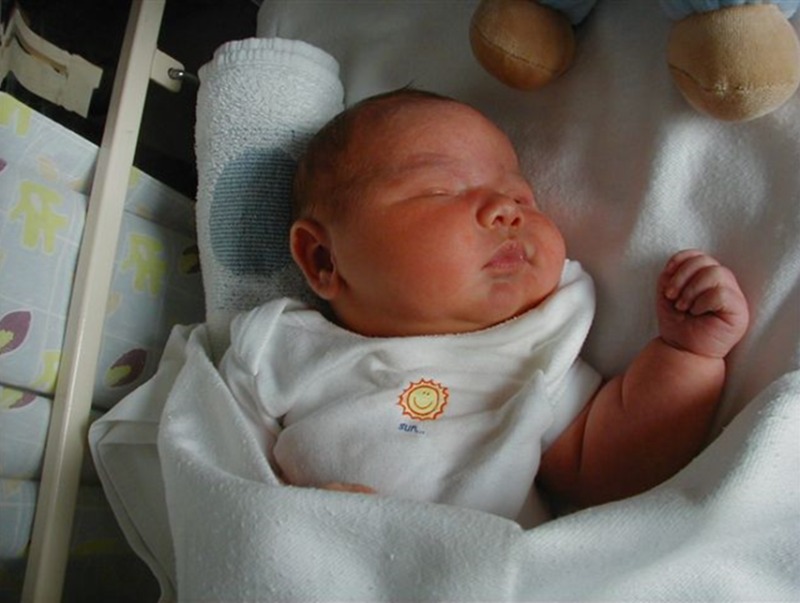Trial aims to reduce serious complications caused by delivery of bigger babies

A nationwide study of 4,000 pregnant women is to determine if delivering bigger babies earlier will prevent serious complications during labour and beyond.
The clinical trial, led by a partnership between University of Warwick, University Hospitals Coventry and Warwickshire (UHCW) NHS Trust and the Perinatal Institute, will help decide if inducing an earlier birth is preferable to pregnancies going full-term and reduce complications.
A baby larger than predicted by a mother's size can cause complications at birth. One of the major problems is difficulty with delivering the shoulders after the head has come out.
Professor Siobhan Quenby of Warwick Medical School, University of Warwick and UHCW NHS Trust said: "As well as being extremely traumatic and painful for the mother it can cause children to be born with conditions such as Erb's palsy, is caused by damage to nerves in the neck during birth. This condition can debilitate the use of a baby's arm, which in some cases can't be rectified."
Professor Jason Gardosi, Director of the Perinatal Institute, said: "Many clinicians in our UK-wide network of obstetricians and midwives are often at a loss of what to advise the mother, as the evidence is not clear, and can be interpreted in different ways."
The size of a baby can be predicted by routine tape measurements of the pregnant woman's abdomen followed by an ultrasound scan if a problem is suspected. The team will be conducting a study of 4,000 pregnancies in 60 maternity hospitals in England when the baby in the womb is suspected to be larger than average and therefore potentially at risk of problems with delivery of the shoulders during birth.
Mothers who consent to be part of the trial will be allocated at random into either an early induction of labour group, with the aim to be delivered at around 38 weeks, or a control group where care is as normal and onset labour is awaited to start naturally. The team will then look at whether as a result of earlier birth there were fewer complications such as difficulty with the delivery of the shoulders.
The study will help decide what the safest method is to care for pregnancies where because of the large size of the baby complications may occur during labour.
The trial is to run over three and half years including a two year recruitment period of 4,000 large for gestational age pregnancies. It is being run in collaboration with King's College London and The Shrewsbury and Telford Hospital NHS Trust. 'The study is funded by the National Institute for Health Research, and will inform NHS policy and provide important information for maternal choice.'
Karen Hillyer, chairperson of the Erb's Palsy Group said: "We are proud to support the 'Big Baby Trial'. We currently have over 2,400 families registered as members of our organisation which illustrates how many families are affected by this condition. We are looking forward to the study and hope it will help prevent or at least minimise the effect of Erb's Palsy on children, mums and families."
Jackie's story
"My first child Samuel was born in 2004. His birth weight was predicted as 8lbs which isn't very large but the midwife was concerned because I'm not very tall, just over 5ft.
"However when he was born he weighed 9lb 14oz - much bigger than expected and I wasn't prepared for the problems which started during delivery.
"About three hours into labour in the last 20 minutes I knew there were problems when the midwife said he was 'turtling' that is his head had delivered but his shoulder was stuck and as a result his head disappeared back into my pelvis
"My contractions had failed so I needed help to get Samuel out. I heard a nurse shout 'press the emergency button' and I was surrounded by medical staff who were manually trying to remove Samuel. To get Samuel out I had to endure the agony of a double episiotomy - that is I was cut twice to release him. And due to advanced stage of labour it was too late to give me an anaesthetic so I had just gas and air. My husband Adrian who was present said I gave out huge scream and I think I passed out due to the pain.
"It wasn't till the following day that I was told there may be problems with Samuel. The doctor told me he has a condition called Erb's Palsy which affects one or all five of the primary nerves that supply movement and feeling to an arm. I was advised to only pick up Samuel by scooping him up from his bottom, not under his shoulders supporting his head as you would with most babies. The doctor told us he'd recover by the time he was three months old and he may need a small amount of physiotherapy
"Now aged 13 Samuel still has the condition which has affected the nerves in his shoulder. He is due an assessment soon in Leeds and there is the chance of an operation that will allow him to use his wrist with more ease. It takes Samuel longer than other children to perform everyday tasks such as getting dressed and he has to take written exams via computer as he has difficulty using a pen. Other problems include cutting up food and putting on a clip-on tie.
"This makes him more introverted because he realises he's different to other children. He often keeps himself to himself and gets frustrated when he has difficulty using his hand. Both his arms are affected; its very slight in his wrist on his left and about 50% loss on his right, hardly any wrist movement and no shoulder movement but has good elbow flexion.
















